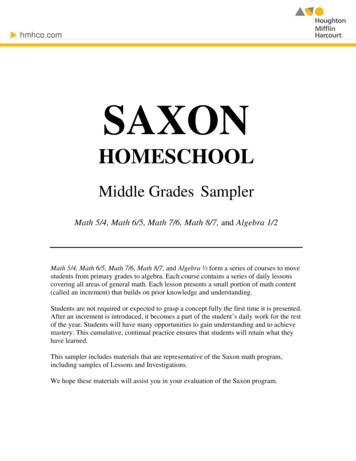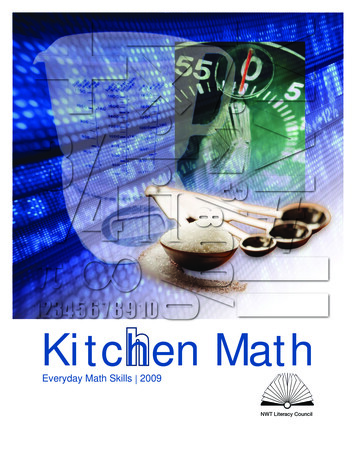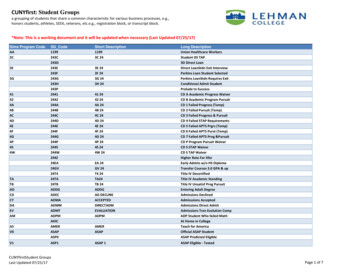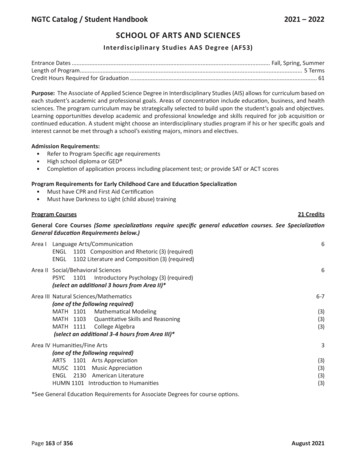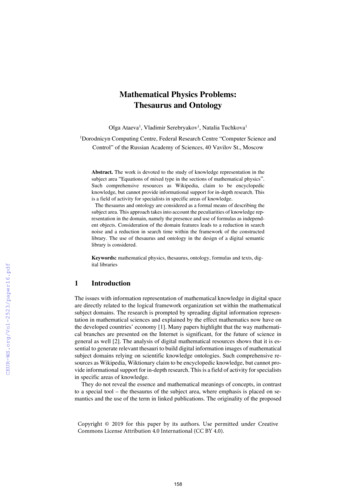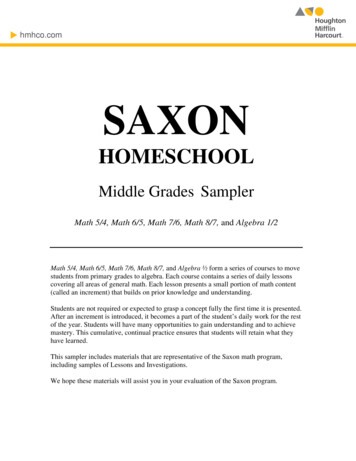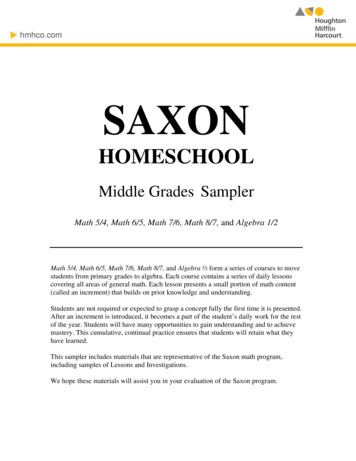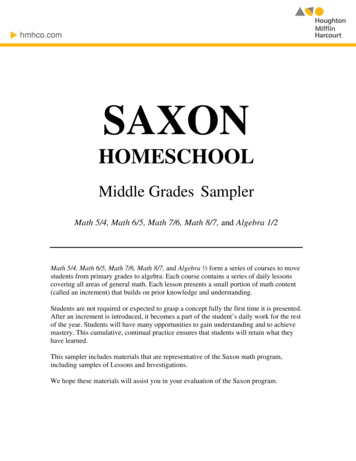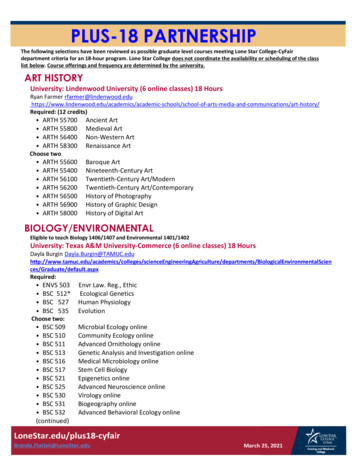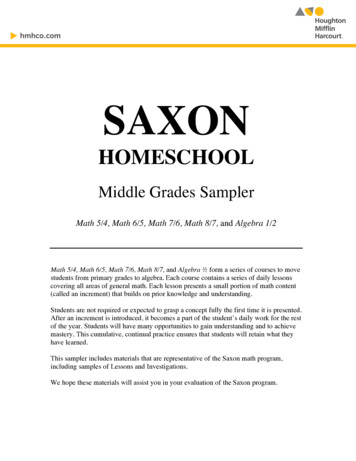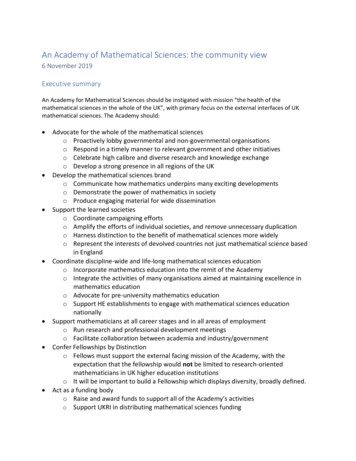
Transcription
MATH - MathematicalSciencesMATHEMATICAL SCIENCES CoursesMATH 100. The Math Cooperative. 1 Credit.This course is to prepare students who did not meet the prerequisites forMATH 102M or MATH 103M.MATH 101M. An Introduction to Mathematics for Critical Thinking. 3Credits.This course fulfills the math general education requirement for somemajors in the College of Arts and Letters and the College of Education andProfessional Studies. It can also be used as a preparation for STAT 130M.An introduction to the ways in which modern mathematics can be usedto analyze the modern world and make logical decisions. Topics includeproblem solving, sets, logic, consumer mathematics (loans, mortgages,annuities), probability, and elementary statistics.MATH 102M. College Algebra. 3 Credits.A basic course in algebra that emphasizes applications and problem-solvingskills. Topics include finding solutions, graphing of linear equations andinequalities, graphs and functions, combining polynomials and polynomialfunctions, factoring polynomials, simplifying and combining rationalexpressions and equations, simplifying roots and radicals, solving radicalequations, and an introduction to quadratic functions and equations. Thiscourse fulfills the math general education requirement and can be usedas a preparation for MATH 162M. MATH 101M is not a prerequisitefor MATH 102M. Not open to students with credit for MATH 162M.Prerequisite: SAT score of 540 or above, or ACT score of 22 or above, orqualifying score on the ALEKS placement exam.MATH 103M. College Algebra with Supplemental Instruction. 3Credits.This course covers the same content as MATH 102M. It is designed forstudents who must complete MATH 102M as part of their degree program,but who do not meet the prerequisites for MATH 102M. MATH 103Mmay be used interchangeably with MATH 102M and may be used as aprerequisite requirement for any course that requires MATH 102M as aprerequisite. MATH 103M will require registration for a supplementalinstruction session each week. Prerequisite: High school GPA of 3.4 orabove, or qualifying score on the ALEKS placement exam, or MATH 100.MATH 162M. Precalculus I. 3 Credits.The first course in a two-course sequence designed to provide a strongpreparation for calculus. Topics include algebraic operations, equationsand inequalities, graphs and functions, polynomial functions, theory ofequations, systems of equations, exponential functions, and logarithmicfunctions. Prerequisite: qualifying score on SAT or ACT, or qualifying scoreon a placement test administered by the University Testing Center or a gradeof C or better in MATH 102M or MATH 103M.MATH 163. Precalculus II. 3 Credits.The second course in a two-course sequence designed to provide strongpreparation for calculus. Topics include exponential and logarithmicfunctions/equations, trigonometric functions/equations, trigonometricidentities, laws of sines and cosines, vectors, polar representation of complexnumbers, binomial theorem, and conic sections. Prerequisite: A grade of Cor better in MATH 162M.MATH 166. Precalculus I and II. 4 Credits.A one-semester precalculus course covering the topics of MATH 162Mand MATH 163 at an accelerated pace. Not available to students with creditin MATH 163. Prerequisites: A grade of C or better in MATH 102M orMATH 103M.MATH 197. Undergraduate Research Experience in Mathematics. 0Credits.Student participation in a supervised, undergraduate research experience forwhich credit will not apply to the degree. Experience must be related to thestudent's major, minor or career area of interest. Prerequisites: permission ofthe instructor.1MATH - Mathematical SciencesMATH 200. Calculus for Business and Economics. 3 Credits.A Calculus course intended for those studying business and economics.Topics include applications of linear, quadratic, rational, exponential,and logarithmic business functions, solving applied linear systems usingmatrices, limits and continuity, derivatives with applications, and integrationwith applications. Prerequisites: A grade of C or better in MATH 162M.MATH 205. Calculus for Life Sciences. 3 Credits.This course covers the standard topics of first semester calculus includinglimits, derivatives and integrals. All examples for this course are drawn frombiological sciences with specific applications to topics covered in the corecourses of the undergraduate Biology major. Prerequisite: A grade of C orbetter in MATH 162M.MATH 211. Calculus I. 4 Credits.A first course in calculus and analytic geometry. Topics includedifferentiation and integration of algebraic and transcendental functionsof one variable and applications. Prerequisites: A grade of C or better inMATH 163 or MATH 166.MATH 212. Calculus II. 4 Credits.A second course in calculus and analytic geometry. Topics includetechniques of integration, polar coordinates, infinite series, solid geometry,vectors, lines and planes. Prerequisite: A grade of C or better in MATH 211.MATH 280. Transfer Credit for Ordinary Differential Equations. 3Credits.This course is a VCCS transfer credit vehicle. Students who have earnedtransferable credit in MATH 279 or 291 at any member institution of theVCCS will be granted credit for MATH 280. The course will not be offeredfor credit by Old Dominion University. Cannot be used to substitute forMATH 307 for MATH majors or minors.MATH 285. Transfer Credit for Calculus III. 4 Credits.This course is a VCCS transfer credit vehicle. Students who have earnedtransferable credit for MATH 275 or 277 at any member institution of theVCCS will be granted credit for MATH 285. The course will not be offeredfor credit by Old Dominion University. Cannot be used to substitute forMATH 312 for MATH majors or minors.MATH 295. Topics in Mathematics. 1-5 Credits.Study of selected topics. Prerequisite: departmental permission.MATH 300. Number Systems. 3 Credits.Sets and systems of numbers, prime, integer, rational, irrational, real,complex and their properties. Representation of numbers. Divisibility,congruence, modular arithmetic, elementary number theory and symboliclogic. (May not be used to satisfy the upper-division elective requirementof the math majors program.) Prerequisite: A grade of C or better inMATH 102M or MATH 103M or MATH 162M.MATH 302. Geometry. 3 Credits.Elementary plane and solid Euclidean geometry with proofs andapplications. Topics include angles, triangles, congruence, quadrilaterals,circles, similarity, perimeter, area, volume, polygons, plane and solidconstructions. A dynamic geometry visualization software is used todiscover geometric properties. (May not be used to satisfy the upper-divisionelective requirement of the math majors program.) Prerequisite: A grade ofC or better in MATH 102M or MATH 103M or MATH 162M.MATH 305. Discrete Math. 3 Credits.Topics include vectors and matrices, linear programming, operations onsets, combinatorics, permutations, combinations, elementary probability,logic, relations and functions, induction, graphs and trees, applications. (Maynot be used to satisfy the upper-division elective requirement of the mathmajors program.) Prerequisite: A grade of C or better in MATH 102M orMATH 103M or MATH 162M.MATH 307. Ordinary Differential Equations. 3 Credits.Topics include first order differential equations and systems, second andhigher order linear equations, solution by series and Laplace transform, andapplications. Prerequisite: A grade of C or better in MATH 212.
MATH 311W. Abstract Algebra. 3 Credits.Topics include introduction to logic and methods of proof; sets, relations,and functions; elementary group and ring theory. This is a writing intensivecourse. Prerequisites: A grade of C or better in ENGL 211C or ENGL 221Cor ENGL 231C; MATH 212 or departmental permission.MATH 312. Calculus III. 4 Credits.A third course in calculus and analytic geometry. Topics include vectorfunctions, partial derivatives, multiple integrals and an introduction to vectorcalculus. Prerequisite: A grade of C or better in MATH 212.MATH 316. Introductory Linear Algebra. 3 Credits.An introduction to linear algebra. Topics include matrices, vectors, vectorspaces, linear transformations, eigenvalues and eigenvectors. Prerequisites:A grade of C or better in MATH 212.MATH 317. Calculus IV: Introductory Analysis. 3 Credits.An introduction to real analysis. Topics covered include completenessand topological properties of the real line, theory of sequences, limitsof functions, the derivative, the Riemann integral, and the FundamentalTheorem of Calculus. Prerequisites: A grade of C or better in MATH 212.MATH 335. Number Systems and Discrete Mathematics. 3 Credits.Estimation and other applications to real world problems, using elementaryprinciples of algebra, geometry, number theory, number systems, anddiscrete mathematics. (May not be used to satisfy the upper-division electiverequirement of the math majors program.) Prerequisite: A grade of C orbetter in MATH 102M or MATH 103M or MATH 162M.MATH 367. Cooperative Education. 1-3 Credits.Student participation for credit based on the academic relevance of the workexperience, criteria, and evaluative procedures as formally determined bythe department and Career Development Services prior to the semester inwhich the work experience is to take place. Available for pass/fail gradingonly. May be repeated for credit. Prerequisite: approval by the departmentand Career Development Services in accordance with the policy for grantingcredit for Cooperative Education programs.MATH 375. Advanced Concepts for Secondary Educators: Functionand Modeling. 3 Credits.This course engages students in explorations and laboratory activitiesdesigned to strengthen and expand their knowledge of the topics foundin college mathematics, and in particular, students will delve into andilluminate the connections between secondary and college mathematics byexploring and highlighting the basic secondary school topics that need tobe mastered in order to solve problems in college mathematics. Throughthis process, students will achieve mastery of topics they will be teachingin secondary mathematics and understand the connection between thehigh school curriculum and their students' success in college and in theworkplace. Prerequisite: MATH 307.MATH 395. Topics in Mathematics. 1-3 Credits.Study of selected topics. Prerequisite: departmental permission.MATH 399. Putnam Exam Problems and Related Topics. 1 Credit.This course is designed to help students prepare for the Putnum Exam an annual national mathematical competition. Problems from previousPutnam Exams and materials related to the solution of such problems will beconsidered. Prerequisites: A grade of C or better in MATH 212.MATH 400/500. History of Mathematics. 3 Credits.Seminal ideas in geometry, arithmetic, algebra, analysis and appliedmathematics (along with their mathematical representations) from antiquity,the age of exploration, the Promethean age to the present day. Prerequisites:MATH 311W or MATH 316 or MATH 317.MATH 401/501. Partial Differential Equations. 3 Credits.Not available to students with credit in MATH 691. Separation of variabletechniques, Sturm-Liouville systems, generalized Fourier series, orthogonalfunctions of the trigonometric, Legendre and Bessel type boundary valueproblems associated with the wave equation and the heat conductionequation in various coordinate systems, applications to physics andengineering. Prerequisites: A grade of C or better in MATH 307 andMATH 312.MATH 404/504. Fundamental Concepts of Geometry. 3 Credits.Fundamentals of Euclidean and non-Euclidean geometry. Alternativesto Euclidean geometry are examined using a variety of mathematicaltechniques. Special topics such as 'Taxicab' geometry, the hyperbolic plane,the art of M.C. Escher, and the mathematics of maps may be included.Prerequisites: MATH 311W.MATH 406/506. Number Theory and Discrete Mathematics. 3 Credits.A survey course. Topics include the prime number theorem, congruences,Diophantine equations, continued fractions, quadratic reciprocity,combinatorics, logic, graphs, trees, algorithms, coding and linearprogramming. Prerequisites: A grade of C or better in MATH 311W andMATH 316.MATH 408/508. Applied Numerical Methods I. 3 Credits.An introduction to the numerical methods commonly used by scientistsand engineers. Topics include solutions of equations of one variable, directmethods for solving linear systems, matrix factorization, stability analysis,iterative techniques, polynomial interpolation, numerical differentiation andintegration, approximation theory, and initial and boundary value problemsfor ordinary differential equations. Prerequisites: A grade of C or better inMATH 316; CS 150 or equivalent programming ability also required.MATH 409/509. Applied Numerical Methods II. 3 Credits.Topics include least squares problems, the QR factorization, the conjugategradient method, Householder transformation and the QR method forapproximating eigenvalues and singular values of a matrix. For applications,the finite difference method and the finite element method for solvingpartial differential equations, trigonometric interpolation and FFT as well asintroductory study of optimization are discussed. Prerequisites: A grade of Cor better in MATH 408/MATH 508.MATH 417/517. Intermediate Real Analysis I. 3 Credits.A rigorous course in classical real analysis. Topics include the topology ofEuclidean n-space, properties of vector valued functions of several variablessuch as limits, continuity, differentiability and integrability, pointwise anduniform convergence of sequences and series of functions; Fourier series.Prerequisite: a grade of C or better in MATH 317.MATH 418/518. Intermediate Real Analysis II. 3 Credits.A rigorous course in classical real analysis. Topics include the topology ofEuclidean n-space, properties of vector valued functions of several variablessuch as limits, continuity, differentiability and integrability, pointwise anduniform convergence of sequences and series of functions; Fourier series.Prerequisite: A grade of C or better in MATH 417.MATH 420/520. Applied Mathematics I: Biomathematics. 3 Credits.Exploring mathematical models in various biological contexts using bothdifference and differential equations: single and multiple species populationgrowth, predator-prey and competing species (using phase plane analysis),epidemiological models of epidemics and pandemics, tumor growth, patternformation in animals and insects. Prerequisites: A grade of C or better inMATH 307.MATH 421/521. Applied Mathematics II: Mathematical Modeling. 3Credits.The philosophy and methodology of mathematical modeling, its successesand limitations. Topics include models of climate change and atmosphericand ocean dynamics, models in other physical and biological contexts, andan introduction to deterministic chaos. Prerequisites: A grade of C or betterin MATH 307, MATH 312, MATH 316, and MATH 317.MATH 422/522. Applied Complex Variables. 3 Credits.Not available to students with credit in MATH 692. Topics include complexnumbers, analytical functions and their properties, derivatives, integrals,series representations, residues and conformal mappings. Applications ofthe calculus of residues and mapping techniques to the solution of boundaryvalue problems in physics and engineering. Prerequisite: A grade of C orbetter in MATH 312.MATH - Mathematical Sciences2
MATH 427/527. Applied Mathematics III: Elasticity. 3 Credits.An introduction to the mathematical theory of linear and non-linear elasticcontinua. Topics include vectors, tensors, deformation, stress, nonlinearconstitutive theory, exact solutions, infinitesimal theory, antiplane strain,plane strain, plane stress, extension, torsion, bending and elastic wavepropagation. Prerequisites: A grade of C or better in MATH 307 andMATH 312.MATH 428/528. Applied Mathematics IV: Fluid Mechanics. 3 Credits.A mathematical investigation of the differential equations governingfluid flow with an emphasis on steady state incompressible flows.The Navier-Stokes equations are derived and some exact solutions arepresented including the potential flow solutions. Topics therefore includeclassical ideal fluid flow and its complex variable representation, variousapproximations to the Navier-Stokes equations, boundary layer theory, andalso surface and internal gravity wave motion, aspects of hydrodynamicstability theory and convection. Other topics may be introduced by theinstructor. Corequisite: MATH 401. Prerequisites: A grade of C or better inMATH 307 and MATH 312.MATH 457/557. Mathematics in Nature. 3 Credits.A calculus and differential equations based description of many patternsobservable in the natural world including wave motion in the air, oceans,rivers, and puddles; rainbows, halos and other meteorological phenomena;arrangement of leaves, petals and branches; height of trees; river meanders;animal and insect markings; mudcracks; spider webs; and others. Partialdifferential equations will be discussed as needed but a knowledge ofordinary differential equations will be assumed. Prerequisite: A grade of Cor better in MATH 307.MATH 461. Preparation for Praxis Certification. 3 Credits.This course will equip students to pass the Praxis 5161 Mathematics:Content Knowledge Exam. This exam is required for teaching licensure atthe secondary Level in Virginia. Only open to students in the SecondarySchool Teaching Option in the Math B.S. program who have NOT yetpassed the Praxis 5161 Exam. Prerequisites: Instructor approval.MATH 494. Entrepreneurship in Mathematics. 3 Credits.This course is designed to help students enhance their personal andprofessional development through innovation guided by faculty membersand professionals. It offers students an opportunity to apply theirknowledge of mathematics to the development of a new product, business,nonprofit program, or other initiative. The real world experiences thatentrepreneurships provide will help students understand how academicknowledge leads to transformations, innovations, and solutions to differenttypes of problems. This course is administered as an independent projectfor individual students, or as group projects. Prerequisites: 3.0 GPA andpermission of the chief departmental advisor.MATH 496/596. Topics in Mathematics. 1-3 Credits.Study of selected topics. Prerequisite: permission of the instructor.MATH 498/598. Tutorial Work in Special Topics in Mathematics. 1-3Credits.Independent study under the direction of an instructor including libraryresearch and reports. Prerequisite: permission of the instructor.MATH 500. History of Mathematics. 3 Credits.Seminal ideas in geometry, arithmetic, algebra, analysis and appliedmathematics (along with their mathematical representations) from antiquity,the age of exploration, the Promethean age to the present day. Prerequisites:MATH 311W or MATH 316 or MATH 317.MATH 501. Partial Differential Equations. 3 Credits.Not available to students with credit in MATH 691. Separation of variabletechniques, Sturm-Liouville systems, generalized Fourier series, orthogonalfunctions of the trigonometric, Legendre and Bessel type boundary valueproblems associated with the wave equation and the heat conductionequation in various coordinate systems, applications to physics andengineering. Prerequisites: A grade of C or better in MATH 307 andMATH 312.3MATH - Mathematical SciencesMATH 504. Fundamental Concepts of Geometry. 3 Credits.Fundamentals of Euclidean and non-Euclidean geometry. Alternativesto Euclidean geometry are examined using a variety of mathematicaltechniques. Special topics such as 'Taxicab' geometry, the hyperbolic plane,the art of M.C. Escher, and the mathematics of maps may be included.Prerequisites: MATH 311W.MATH 506. Number Theory and Discrete Mathematics. 3 Credits.A survey course. Topics include the prime number theorem, congruences,Diophantine equations, continued fractions, quadratic reciprocity,combinatorics, logic, graphs, trees, algorithms, coding and linearprogramming. Prerequisites: A grade of C or better in MATH 311W andMATH 316.MATH 508. Applied Numerical Methods I. 3 Credits.An introduction to the numerical methods commonly used by scientistsand engineers. Topics include solutions of equations of one variable, directmethods for solving linear systems, matrix factorization, stability analysis,iterative techniques, polynomial interpolation, numerical differentiation andintegration, approximation theory, and initial and boundary value problemsfor ordinary differential equations. Prerequisites: A grade of C or better inMATH 316; CS 150 or equivalent programming ability are also required.MATH 509. Applied Numerical Methods II. 3 Credits.Topics include least squares problems, the QR factorization, the conjugategradient method, Householder transformation and the QR method forapproximating eigenvalues and singular values of a matrix. For applications,the finite difference method and the finite element method for solvingpartial differential equations, trigonometric interpolation and FFT as well asintroductory study of optimization are discussed. Prerequisites: A grade of Cor better in MATH 508.MATH 517. Intermediate Real Analysis I. 3 Credits.A rigorous course in classical real analysis. Topics include the topology ofEuclidean n-space, properties of vector valued functions of several variablessuch as limits, continuity, differentiability and integrability, pointwise anduniform convergence of sequences and series of functions; Fourier series.Prerequisites: A grade of C or better in MATH 317.MATH 518. Intermediate Real Analysis II. 3 Credits.A rigorous course in classical real analysis. Topics include the topology ofEuclidean n-space, properties of vector valued functions of several variablessuch as limits, continuity, differentiability and integrability, pointwise anduniform convergence of sequences and series of functions; Fourier series.Prerequisite: A grade of C or better in MATH 517.MATH 520. Applied Mathematics I: Biomathematics. 3 Credits.Exploring mathematical models in various biological contexts using bothdifference and differential equations: single and multiple species populationgrowth, predator-prey and competing species (using phase plane analysis),epidemiological models of epidemics and pandemics, tumor growth, patternformation in animals and insects. Prerequisites: A grade of C or better inMATH 307.MATH 521. Applied Mathematics II: Mathematical Modeling. 3Credits.The philosophy and methodology of mathematical modeling, its successesand limitations. Models of climate change, atmospheric and ocean dynamics,models in other physical and biological contexts, and introduction todeterministic chaos. Prerequisites: A grade of C or better in MATH 307,MATH 312, MATH 316 and MATH 317.MATH 522. Applied Complex Variables. 3 Credits.Not available to students with credit in MATH 692. Topics include complexnumbers, analytical functions and their properties, derivatives, integrals,series representations, residues and conformal mappings. Applications ofthe calculus of residues and mapping techniques to the solution of boundaryvalue problems in physics and engineering. Prerequisites: A grade of C orbetter in MATH 312.
MATH 527. Applied Mathematics III: Elasticity. 3 Credits.An introduction to the mathematical theory of linear and non-linear elasticcontinua. Topics include vectors, tensors, deformation, stress, nonlinearconstitutive theory, exact solutions, infinitesimal theory, antiplane strain,plane strain, plane stress, extension, torsion, bending and elastic wavepropagation. Prerequisites: A grade of C or better in MATH 307 andMATH 312.MATH 528. Applied Mathematics IV: Fluid Mechanics. 3 Credits.A mathematical investigation of the differential equations governingfluid flow with an emphasis on steady state incompressible flows.The Navier-Stokes equations are derived and some exact solutions arepresented including the potential flow solutions. Topics therefore includeclassical ideal fluid flow and its complex variable representation, variousapproximations to the Navier-Stokes equations, boundary layer theory, andalso surface and internal gravity wave motion, aspects of hydrodynamicstability theory and convection. Other topics may be introduced by theinstructor. Corequisite: MATH 501.MATH 557. Mathematics in Nature. 3 Credits.A calculus and differential equations based description of many patternsobservable in the natural world including wave motion in the air, oceans,rivers, and puddles; rainbows, halos and other meteorological phenomena;arrangement of leaves, petals and branches; height of trees; river meanders;animal and insect markings; mudcracks; spider webs; and others. Partialdifferential equations will be discussed as needed but a knowledge ofordinary differential equations will be assumed. Prerequisites: A grade of Cor better in MATH 307.MATH 596. Topics in Mathematics. 1-3 Credits.Study of selected topics. Prerequisite: permission of the instructor.MATH 598. Tutorial Work in Special Topics in Mathematics. 1-3Credits.Independent study under the direction of an instructor including libraryresearch and reports. Prerequisite: permission of the instructor.MATH 605. Complex Variables I. 3 Credits.An advanced course in complex analysis. Prerequisites: MATH 501,MATH 518 and MATH 522.MATH 615. Advanced Calculus for Teachers. 3 Credits.An introduction to real analysis. Topics include the field and order axioms,completeness of the real line, theory of sequences, limits of function,continuity, differentiablility, sequences and series of functions, uniformconvergence. Prerequisites: MATH 212.MATH 622. Numerical Solutions to Differential Equations. 3 Credits.An in-depth study of the numerical solution to ordinary and partialdifferential equations. Topics include linear multi-step methods, RungeKutta methods, stiff differential equations, collocation methods, and strongand weak stability analysis for ODEs. For PDEs, finite difference methodsare examined. Prerequisites: MATH 509.MATH 632. Master’s Project. 3 Credits.Under the guidance of a faculty member in the Department of Mathematicsand Statistics, the student will undertake a significant data analysis problemin a scientific setting outside the department. A written report and/or publicpresentation of results will be required. Prerequisite: permission of graduateprogram director.MATH 637. Tensor Calculus and Differential Geometry. 3 Credits.Topics include metric spaces, bilinear and quadratic forms, tensors, pointmanifolds, theory of curves, geodesic differentiation, theory of surfaces,curvature of general manifolds, integrability. Prerequisites: MATH 517.MATH 638. Mathematical Theories of Continua. 3 Credits.Topics include deformation, motion, stress, conservation laws, andconstitutive theories. Prerequisites: MATH 501 and MATH 637.MATH 691. Engineering Analysis I. 3 Credits.Not available to students with credit in MATH 501. Separation of variabletechniques, Sturm-Liouville systems, generalized Fourier series, orthogonalfunctions of the trigonometric, Legendre and Bessel type, boundary valueproblems associated with the wave equation and the heat conductionequation in various coordinate systems, applications to physics andengineering.MATH 692. Engineering Analysis II. 3 Credits.Not available to students with credit in MATH 522. Topics include complexnumbers, analytical functions and their properties, derivatives, integrals,series representations, residues and conformal mappings. Applications ofthe calculus of residues and mapping techniques to the solution of boundaryvalue problems in physics and engineering. Prerequisites: MATH 312.MATH 693. Engineering Analysis III. 3 Credits.Advanced topics in the theory and application of ordinary differentialequations, distributions, Green's functions, classification of partialdifferential equations, initial-value problems, eigenfunction expansions forboundary-value problems, selected special functions, singular perturbationtheory for differential equations. Prerequisites: MATH 501 or MATH 691.MATH 695. Seminar in Mathematics. 1-3 Credits.Seminar in advanced topics. Prerequisites: permission of the instructor.MATH 616. Computational Linear Algebra. 3 Credits.Topics include singular value decomposition, sparse systems, Krylovsubspace methods, large sparse eigenvalue problems and iterative methods.This course also covers applications of computational linear algebra inthe areas of image compression, data processing and principal componentanalysis. Prerequisites: MATH 312, MATH 316 and MATH 508.MATH 696. Topics in Mathematics. 1-3 Credits.Advanced study of selected topics. Prerequisites: permission of theinstructor.MATH 617. Measure and Integration. 3 Credits.An introduction to measure theory and integration theory with specialemphasis on Lebesgue measure and the Lebesgue integral includingFatou's Lemma, the Monotone Convergence Theorem and the DominatedConvergence Theorem. Prerequisite: MATH 518.MATH 698. Research. 3 Credits.MATH 618. Applied Functional Analysis. 3 Credits.Topics include orthogonal projections to subspaces, duality, the HahnBanach theorem and the Banach-Steinhaus theorem, L-2 spaces andconvolution operators, fixed point theory, construction of Hilbertspaces, approximation procedures in Hilbert spaces, and spectral theory.Prerequisites: MATH 617.MATH 620. Optimization Techniques. 3 Credits.Theory and computational algorithms for the optimization of constrainedlinear and nonlinear systems or for locating the maximum of a constrainednonlinear function. Applications to problems in economics, operationsresearch and systems theory. Prerequisites: MATH 312 and MATH 316.MATH 697. Topics in Mathematics. 1-3 Credits.Advanced study of selected topics.MATH 699. Thesis. 3 Credits.MATH 702. Integral Equations. 3 Credits.Advanced material in theory and application of integral equations.Formulation of the integral equation problems, cause and
equation in various coordinate systems, applications to physics and engineering. Prerequisites: A grade of C or better in MATH 307 and MATH 312. MATH 404/504. Fundamental Concepts of Geometry. 3 Credits. Fundamentals of Euclidean and non-Euclidean geometry. Alternatives to Euclidean geometry are examined using a variety of mathematical techniques.
